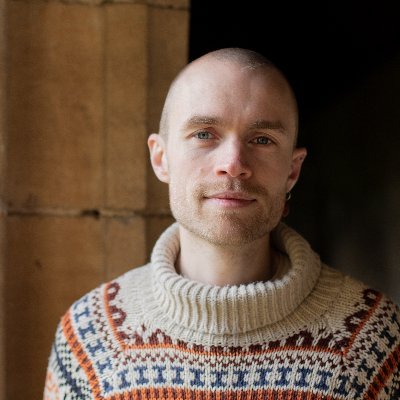
Adam Finnemann
@AFinnemann
Followers
293
Following
907
Media
14
Statuses
124
Phd in psychological methods @ University of Amsterdam. Complexity is being right, but not that right.
Amsterdam, Nederland
Joined December 2016
Eager to tackle challenges related to climate change? Then apply for the Amsterdam Complexity School on Climate Change hosted @UvA_IAS, which brings together early career researchers from all disciplines and non-academic stakeholders. More info: https://t.co/ajcVp96hxw
0
4
5
New study by @UMH_UvA: ➡️urban living is linked to lower levels of social and economic satisfaction and well-being ➡️urban residents exhibit greater psychological inequality ➡️‘Goldilocks zone’ between cities and rural areas https://t.co/PefRaiJl1Q
uva.nl
A new study conducted by the Centre for Urban Mental Health at the University of Amsterdam finds that, in a sample of 156,000 UK residents aged 40 and up, urban living is linked to lower levels of...
2
11
17
Check out our speakers! Climate scientists, economists, governance and justice researchers, social movement scholars, activists, artists, policymakers, ... Do you want to hear from them? Then apply for the Amsterdam Complexity School on Climate Change! https://t.co/ajcVp95JHY
2
8
30
For the full story, see https://t.co/Y2mkqA10jN And thanks to my collaborator, @karoline_huth, @SachaEpskamp, @BorsboomDenny, and Han van der Maas 😊
0
0
3
Conclusion ✨: UK urban areas are associated with the lowest and most unequal satisfaction levels. At the same time, these cities are incredibly popular and offer an abundance of opportunities. We term this conflict the urban desirability paradox.
1
0
1
Key Findings 3 📈: We discovered 'optimal distances' in the hinterlands of cities - areas with highest averages & least variation. These optimal distances are relative to city size, so we show them for three cities of different sizes.
1
0
1
Key Findings 2 📈: We also analyzed the variability in all variables as a function of urbanicity. For all variables, except for general happiness, urban areas showed increased standard deviation. This indicates greater inequality in urban settings.
1
0
1
Key Findings 1 📈: We analyzed the average happiness, meaningful life, family sat., friendship sat., loneliness, income, financial sat., and job sat., as a function of urbanicity. For all variables, except income, urban residents score worse.
1
0
1
Methodology 🛠️: We did urban-rural comparisons using a novel, continuous, and objective measure, that avoids defining city boundaries and detects sub-urban effects. We calculate the shortest distance to city centers, normalized to account for differences in city sizes 🌆
1
0
2
Thrilled to share my first study in #UrbanPsychology 🚀 Do the urban socio-economic opportunities translate into psychological benefits? To answer this, we analyzed social, economic satisfaction, and well-being of 156,000 UK residents 🌆
1
5
20
New Post from Unreasonable Doubt! In this weeks post @AFinnemann writes about how much of science is skewed by publication bias and how to solve it. Read and subscribe! (link in next post)
1
1
5
Excited to share a new blog post! Talking to @BartosFra, I grasped the gravity of publication bias. In this piece, I try to convince you as well with two strong examples. Lastly, I discuss what to do about it and why it offers important low-hanging opportunities! #sciencenews
2
1
5
2 weeks left to apply for the Winter Workshop 2024. If you want to spend a fantastic week collaborating with other young researchers in the complexity science field do not hesitate to apply!! Application form: https://t.co/KvF7WCzQRs
0
4
7
Summer is over...⛱️ This means that the Winter Workshop on Complex Systems is OFFICIALLY BACK! 🎉 Stay tuned in the following days for more exciting announcements...😉
0
6
22
Catch my poster about urban psychological struggles and semi-urban bliss at #ic2s2!! It's today from 12.30 at stand 90 🎊
0
1
11
When methodologist design simulations to validate their own models 🤖
When physicists say their toy model captures the essential features of a real world phenomenon https://t.co/nITrxMjkNy
1
0
8
Calling APS23. I'll be presenting exciting findings on how cities shape our psychology at the Urban Mental Health session, today at 16. Hope to see you there if you are in Washington! 🥳 #aps23dc
0
1
17
In this weeks article, Eirik Gjerstad Argues that AI will change what we consider to be the Ideal Human. In the beginning AI will attempt to imitate people, but it might that down the line humans will begin to imitate AI. Link below:
1
4
6
Interested in the bizarre academic publishing system, academic egos, and how it threatens peer-review? Then my new blog post for @Unreasonable might be of interest.
In this weeks Unreasonable Doubt @AFinnemann shows how a the growth of science and the incentives of commercial academic publishing is pushing the peer review to the brink of collapse. Read. Enjoy. Subscribe. https://t.co/Er4yGyv8cr
1
5
11





